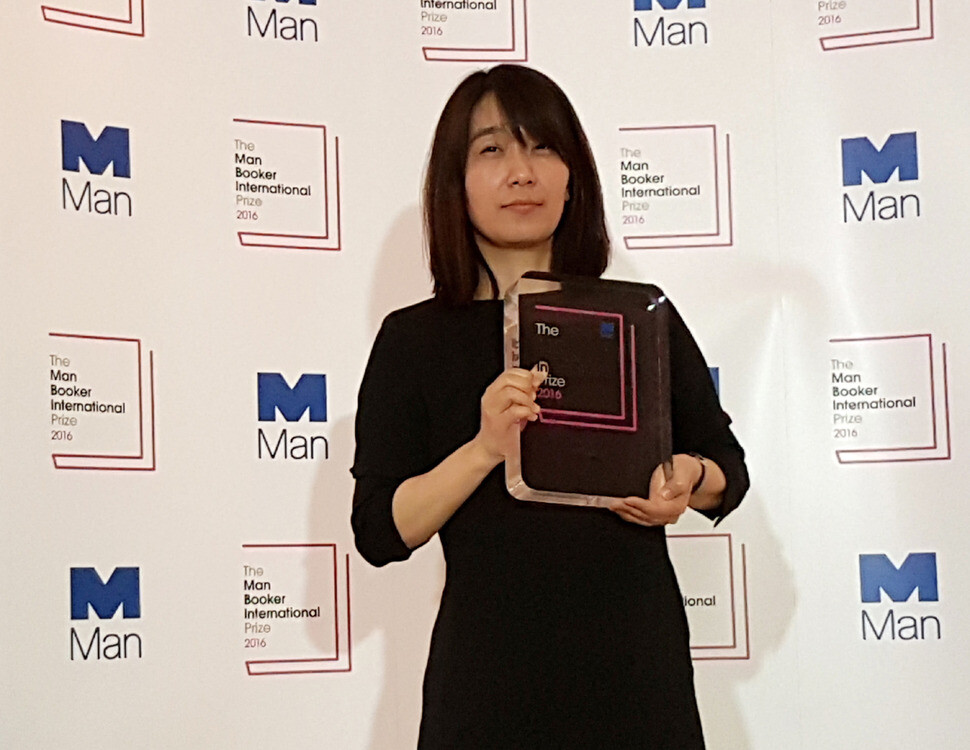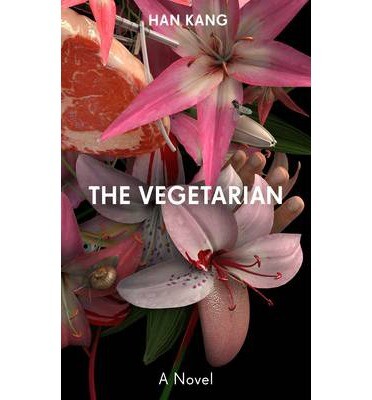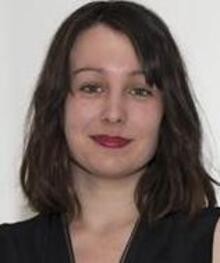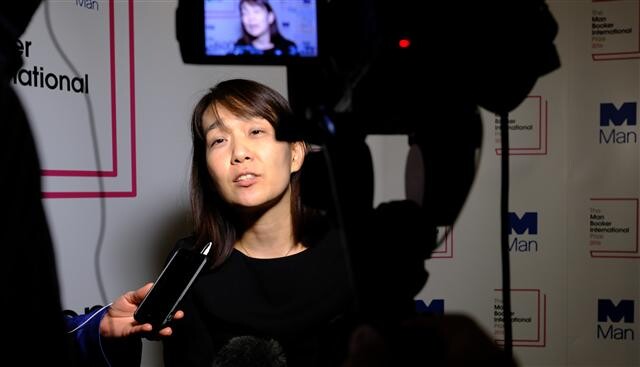hankyoreh
Links to other country sites 다른 나라 사이트 링크
S. Korean literature comes to the forefront with Booker Int’l win

The awarding of a Man Booker International Prize to Han Kang’s novel “The Vegetarian” is being cited as a major step forward in the globalization of South Korean literature.
Kwak Hyo-hwan, a poet and secretary general for the Daesan Foundation, which supported the English translation of “The Vegetarian,” told the Hankyoreh in a May 17 telephone interview that the award - considered one of the top honors in world literature alongside the Nobel Prize and Prix Goncourt - was “evidence that the support efforts of the Daesan Foundation since its 1992 founding and the Literature Translation Institute of Korea (LTIK) since its 2001 founding are paying off.”

“More and more, we are seeing young and talented translators coming up, which is raising our hopes for a lot of achievements in the future,” Kwak said.
LTIK president Kim Seong-kon called the honor an “achievement that represents great progress toward the globalization of literature symbolized by the Nobel Prize.”
“As the Man Booker International Prize goes to both the original writer and the translator, it’s a particular honor for the translator Deborah Smith,” Kim added.
“If it was a talented translator like Edward Seidensticker who was behind the Nobel Prize going to the Japanese author Yasunari Kawabata, then South Korean literature finally has a good translator,” he said.
The importance of the translation was also highlighted in comments by Boyd Tonkin, chairman of the Man Booker International Prize’s judging panel.
“It has extraordinary poise and tact and control,” Boyd said of the novel. “And that’s done both by Han Kang and by this amazing translation from Deborah Smith.”
But Kwak also cautioned that the prize was “just a new, positive signal that doesn’t necessarily mean a full-scale change in terms of the globalization of South Korean literature.”
“We need to be more systematic about training translators and expanding frameworks for meetings and exchanges between South Korean authors and authors around the world,” he added.

News of the Man Booker Prize nomination of “The Vegetarian” resulted in sales of over 40,000 copies for the novel, published in Korean in 2007. Around 4,000 copies each were sold at Kyobo Books and on the online bookstore Aladdin on the award date of May 17 alone; at another online bookstore, Yes24, sales were up by 38 times from the day before.
Han‘s honor is also drawing attention as a chance for South Korean literature to regain readers’ trust and love after the shock and ensuing slump from a plagiarism scandal last year involving author Shin Kyung-sook, who was accused of lifting passages from late Japanese author Yukio Mishima.
A New Yorker article titled “Can a Big Government Push Bring the Nobel Prize in Literature to South Korea?” last January noted the lack of interest in literary fiction among South Korean readers, with most attention on scoring high-profile honors such as a Nobel Prize.
Poet Ahn Do-yeon responded to news of Han’s honor on the morning of May 17 by calling it a “truly great cause of celebration.”
“What I’d like to hear now is that more South Koreans are reading books,” he added.

Who is Han Kang
Han Kang was born in Gwangju in 1970 and grew up in Seoul, where she graduated from Yonsei University in Korean literature. Her father is Han Seung-won, the veteran author of books such as “Aje Aje Bara Aje” and “Donghakje.”
Following graduation, Han began her career as a poet, with a piece selected for the winter 1993 edition of “Literature and Society.” The following year, her short story “Red Anchor” was chosen in a spring literary contest run by the Seoul Sinmun newspaper, marking the beginning of her career as a fiction writer. In 1995, she published her first fiction collection “Love of Yeosu” at the age of just 25. Since then, she has published two more short story collections (including “The Fruit of My Woman” and “A Yellow-Patterned Eternity”) and six novels (“The Black Deer,” “Your Cold Hand,” “Breath Fighting,” “The Vegetarian,” “Greek Lessons,” and “Human Acts”), along with several poetry, children’s story, and prose collections.
In one interview, Han described how the May 1980 Democratization Movement in Gwangju changed her life. After their move to Seoul, her father showed her an album of photos of the massacre that had taken place.
“Seeing that photo album at the age of thirteen was a secret moment that forced me to ask fundamental questions about being human,” she explained.
“It was in my third novel ’The Vegetarian‘ that I first began exploring the fundamental questions I had harbored since that time,” she added.
Consisting of three sections titled “The Vegetarian,” “Mongolian Mark,” and “Flaming Trees,” the book “The Vegetarian” explores protagonist Yeong-hye through the perspectives of three people observing her adamant refusal to eat meat and desire to become a tree instead. They include her husband, who observes her slashing her wrists after her father tries to force meat into her mouth; her video artist brother-in-law, who lusts after her body after hearing that she still has a “Mongolian mark” on her buttocks; and her older sister In-hye, who visits her in a mental hospital where she refuses food, water, and an intravenous line. In the process, the author explores themes of violence and desire and the inner world suppressed by them.
Published in 2014, “Human Acts” is a head-on examination of the May 1980 massacre in Gwangju that came as such a shock to the young Han. Centering on the character of Dong-ho, a 16-year-old boy who is shot by martial law forces while occupying the provincial office, it presents the drama of slaughter and resistance through the writer’s characteristic dense, deeply poetic sentences. While attending the Paris Book Fair in March, Han herself identified it as her favorite of her own works.
Previous honors for Han include the Yi Sang, Dongri, and Hwang Sun-won Literary awards. In the case of the Yi Sang Literary Award, she and father Han Seung-won (a 1988 recipient) went down as the first daughter-father duo to both win the prize.
Han also makes up a literary family with her husband, literary critic and Kyung Hee Cyber University professor Hong Yong-hee. She is currently a professor in the Seoul Institute of the Arts Department of Media.
By Choi Jae-bong, literature correspondent
Please direct questions or comments to [english@hani.co.kr]

Editorial・opinion
![[Column] Has Korea, too, crossed the Rubicon on China? [Column] Has Korea, too, crossed the Rubicon on China?](https://flexible.img.hani.co.kr/flexible/normal/500/300/imgdb/original/2024/0419/9317135153409185.jpg) [Column] Has Korea, too, crossed the Rubicon on China?
[Column] Has Korea, too, crossed the Rubicon on China?![[Correspondent’s column] In Japan’s alliance with US, echoes of its past alliances with UK [Correspondent’s column] In Japan’s alliance with US, echoes of its past alliances with UK](https://flexible.img.hani.co.kr/flexible/normal/500/300/imgdb/original/2024/0419/2317135166563519.jpg) [Correspondent’s column] In Japan’s alliance with US, echoes of its past alliances with UK
[Correspondent’s column] In Japan’s alliance with US, echoes of its past alliances with UK- [Editorial] Does Yoon think the Korean public is wrong?
- [Editorial] As it bolsters its alliance with US, Japan must be accountable for past
- [Guest essay] Amending the Constitution is Yoon’s key to leaving office in public’s good graces
- [Editorial] 10 years on, lessons of Sewol tragedy must never be forgotten
- [Column] A death blow to Korea’s prosecutor politics
- [Correspondent’s column] The US and the end of Japanese pacifism
- [Guest essay] How Korea turned its trainee doctors into monsters
- [Guest essay] As someone who helped forge Seoul-Moscow ties, their status today troubles me
Most viewed articles
- 1[Column] The clock is ticking for Korea’s first lady
- 2Hong Se-hwa, voice for tolerance whose memoir of exile touched a chord, dies at 76
- 3After 2 months of delayed, denied medical care, Koreans worry worst may be yet to come
- 4[Column] Has Korea, too, crossed the Rubicon on China?
- 5US overtakes China as Korea’s top export market, prompting trade sanction jitters
- 6[Correspondent’s column] In Japan’s alliance with US, echoes of its past alliances with UK
- 7All eyes on Xiaomi after it pulls off EV that Apple couldn’t
- 8Samsung barricades office as unionized workers strike for better conditions
- 9[Photo] Smile ambassador, you’re on camera
- 10[Correspondent’s column] The US and the end of Japanese pacifism